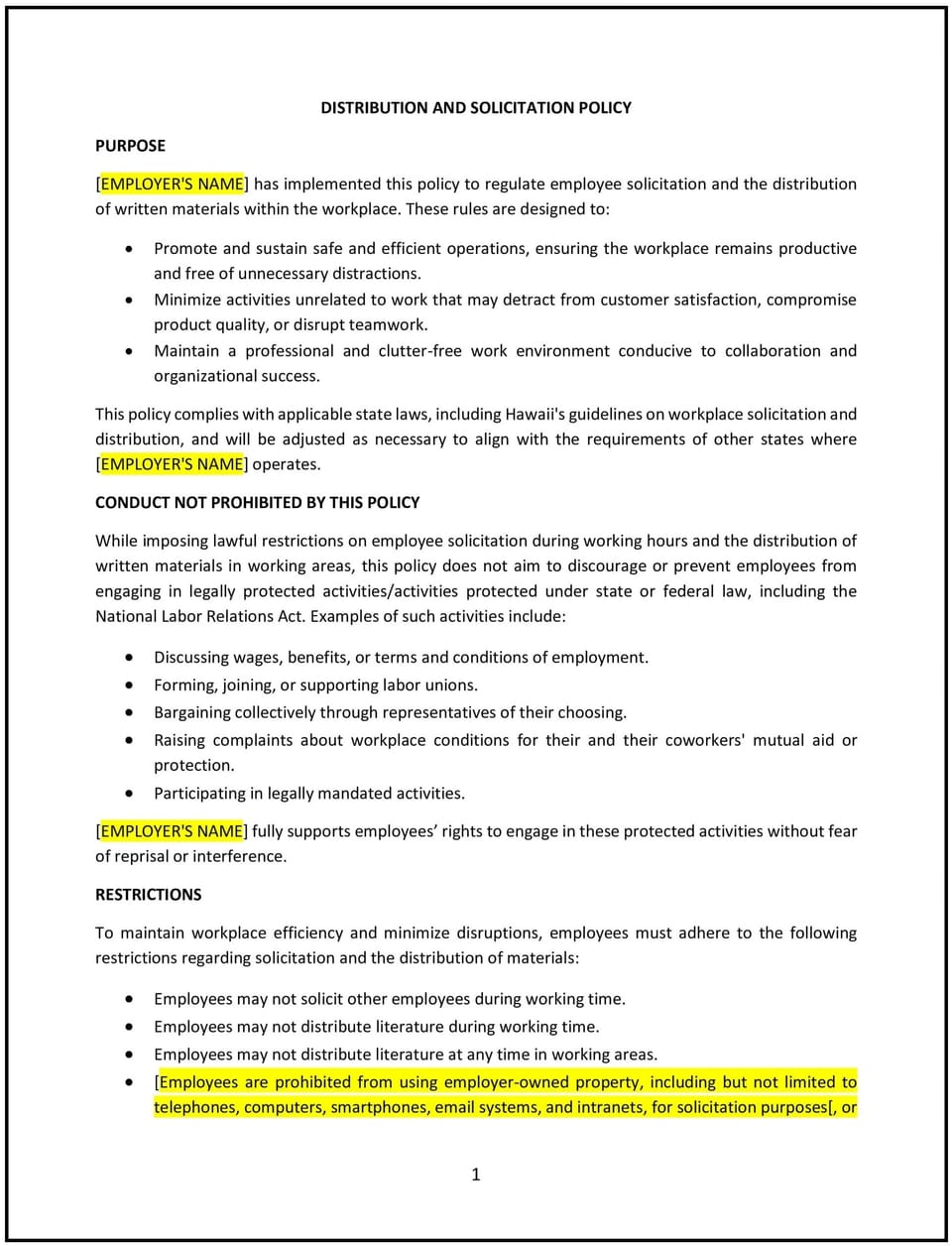Distribution and solicitation policy (Hawaiʻi): Free template

Distribution and solicitation policy (Hawaiʻi)
A distribution and solicitation policy helps Hawaiʻi businesses establish guidelines for managing the distribution of materials and solicitation activities in the workplace. This policy outlines rules for employees and non-employees regarding the dissemination of information, fundraising, or promotional activities, while addressing Hawaiʻi-specific legal and cultural considerations. It is designed to maintain a professional work environment, minimize disruptions, and protect the business’s interests.
By implementing this policy, businesses in Hawaiʻi can ensure clear expectations, reduce potential conflicts, and promote a focused and productive workplace.
How to use this distribution and solicitation policy (Hawaiʻi)
- Define prohibited activities: Specify which distribution and solicitation activities are not allowed, such as commercial solicitations, political campaigning, or unauthorized fundraising.
- Establish permitted activities: Outline acceptable activities, such as distributing informational materials or organizing charitable events, and any conditions or restrictions that apply.
- Set time and place restrictions: Define when and where distribution or solicitation activities are allowed, such as during breaks or in designated common areas.
- Address non-employee activities: Provide rules for non-employees, such as vendors or visitors, regarding distribution or solicitation on business premises.
- Communicate the policy: Share the policy with employees during onboarding and through internal communications to ensure awareness and understanding.
- Train managers: Educate supervisors on how to enforce the policy consistently and handle violations appropriately.
- Monitor compliance: Regularly review workplace activities to ensure adherence to the policy and address any violations promptly.
- Review and update the policy: Regularly assess the policy’s effectiveness and make adjustments as needed to reflect changes in laws, workplace dynamics, or business needs.
Benefits of using this distribution and solicitation policy (Hawaiʻi)
This policy offers several advantages for Hawaiʻi businesses:
- Maintains a professional environment: Clear guidelines help minimize disruptions and maintain a focused workplace.
- Reduces conflicts: A structured policy prevents misunderstandings and disputes related to distribution or solicitation activities.
- Protects business interests: Prohibiting unauthorized activities safeguards the business from potential legal or reputational risks.
- Promotes productivity: Limiting distractions allows employees to focus on their work and maintain productivity.
- Aligns with legal requirements: The policy helps businesses comply with Hawaiʻi labor laws and federal regulations regarding workplace activities.
- Encourages accountability: Employees understand their responsibilities and limitations regarding distribution and solicitation.
- Supports inclusivity: Permitting certain activities, such as charitable events, fosters a sense of community and engagement among employees.
Tips for using this distribution and solicitation policy (Hawaiʻi)
- Communicate the policy effectively: Share the policy with employees during onboarding and through regular reminders, such as emails or posters in common areas.
- Provide training: Educate employees and managers on the policy’s guidelines, including permitted and prohibited activities.
- Be consistent: Enforce the policy uniformly to avoid perceptions of favoritism or bias.
- Monitor activities: Regularly review workplace activities to ensure compliance with the policy and address any violations promptly.
- Be transparent: Clearly explain the policy’s purpose, benefits, and expectations to employees to build trust and cooperation.
- Review the policy periodically: Update the policy as needed to reflect changes in laws, workplace dynamics, or business needs.
Q: Why should Hawaiʻi businesses adopt a distribution and solicitation policy?
A: Businesses should adopt this policy to maintain a professional work environment, reduce disruptions, and protect their interests.
Q: What types of activities are typically prohibited?
A: Prohibited activities may include commercial solicitations, political campaigning, or unauthorized fundraising.
Q: What activities are usually permitted?
A: Permitted activities may include distributing informational materials, organizing charitable events, or other non-disruptive activities, subject to specific conditions.
Q: How should businesses handle non-employee activities?
A: Businesses should establish rules for non-employees, such as vendors or visitors, regarding distribution or solicitation on business premises.
Q: What training should businesses provide to employees?
A: Businesses should educate employees on the policy’s guidelines, including permitted and prohibited activities, and how to report violations.
Q: How should businesses enforce the policy?
A: Businesses should enforce the policy consistently, address violations promptly, and ensure managers are trained to handle issues appropriately.
Q: How often should the policy be reviewed?
A: The policy should be reviewed annually or as needed to reflect changes in laws, workplace dynamics, or business needs.
This article contains general legal information and does not contain legal advice. Cobrief is not a law firm or a substitute for an attorney or law firm. The law is complex and changes often. For legal advice, please ask a lawyer.


